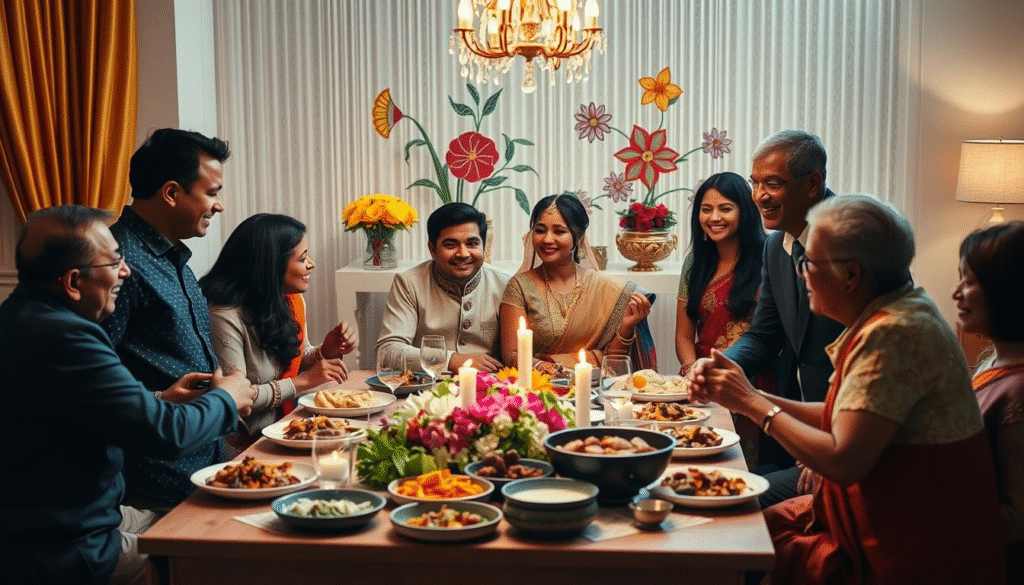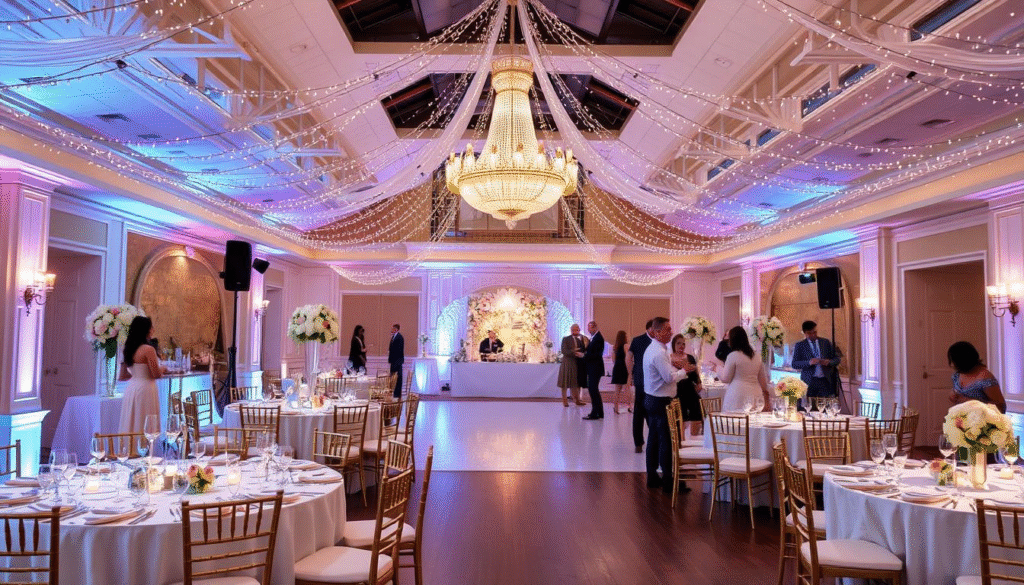Every love story is special, filled with love, laughter, and memories. When you decide to getting married, excitement and dreams of a beautiful wedding grow. But, the journey of planning can feel overwhelming.
It’s not just about the flowers or the cake. It’s about creating a day that shows your deepest desires and celebrates your love. As you start this journey, remember that every decision makes your dream wedding unique. This guide will give you essential tips to make your day special and true to your love.
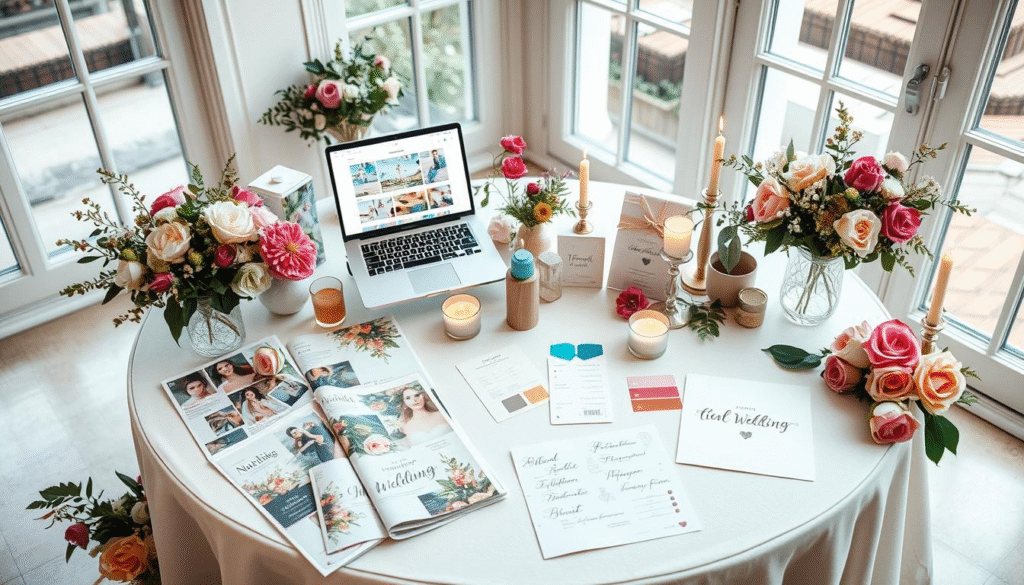
Understanding Your Wedding Vision
Defining your wedding vision is key to planning your big day. It includes your style, the atmosphere, and the elements you want. Knowing your aesthetic helps guide your choices as you plan.
Defining Your Style: Traditional vs. Modern
Wedding styles often fall into traditional or modern categories. Traditional weddings feature elegant clothes, formal ceremonies, and classic flowers. They honor heritage and family traditions.
Modern weddings, on the other hand, are more relaxed and contemporary. They might include unique venues, personalized decor, and flexible ceremony formats. Combining styles can make your wedding truly unique.
Creating a Mood Board for Inspiration
A mood board is a great way to visualize your wedding. It combines colors, themes, and styles you love. Using Pinterest or Canva makes it easy to collect ideas.
A good mood board organizes your thoughts and shows vendors what you envision. It’s a powerful tool for planning your wedding.
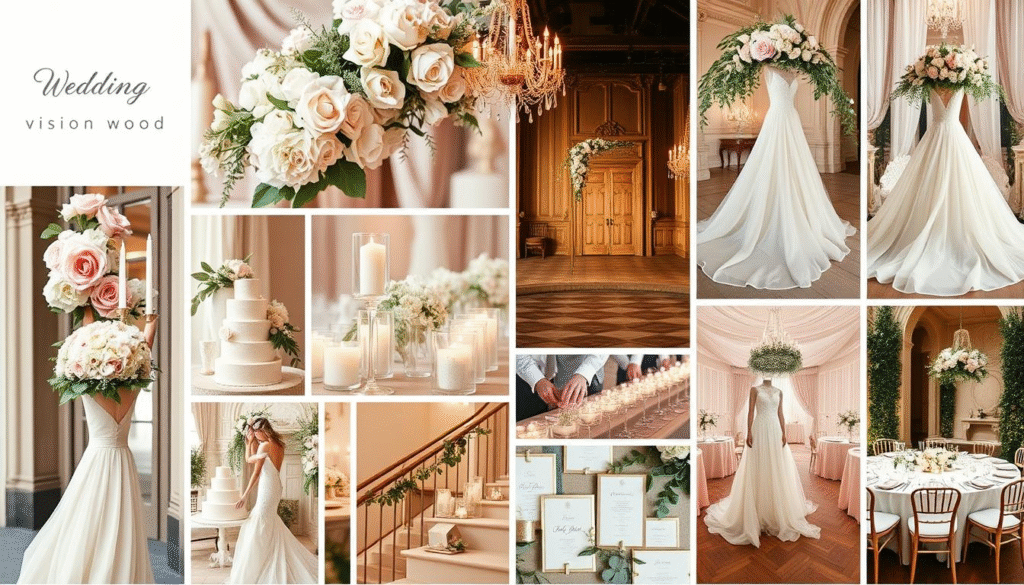
| Wedding Style | Elements | Common Themes |
| Traditional Weddings | Classic Attire, Formal Venue | Heritage, Elegance |
| Modern Weddings | Unique Venues, Contemporary Decor | Trendy, Personalization |
Setting Your Wedding Budget
Creating a wedding budget is key to having your dream wedding without financial worries. Knowing how to split your costs helps guide your planning. Start by listing all your expenses to see what you’ll likely spend.
Breaking Down Your Wedding Costs
When setting your budget, think about these main costs:
| Expense Category | Estimated Percentage of Total Budget |
| Venue | 30% |
| Catering | 25% |
| Attire | 10% |
| Entertainment | 15% |
| Photography | 10% |
| Miscellaneous | 10% |
This breakdown shows how different costs add up. It helps you manage your spending better. By knowing where your money goes, you can spend more wisely and avoid overspending.
Tips for Staying within Budget
To keep your budget in check, try these tips:
- Prioritize necessities: Decide what’s most important to your wedding.
- Explore alternatives: Look for cheaper options like DIY decor or local vendors.
- Consider off-peak times: Getting married during the off-season can save on venue and food costs.
- Track expenses meticulously: Keep your budget up to date to stay on track.
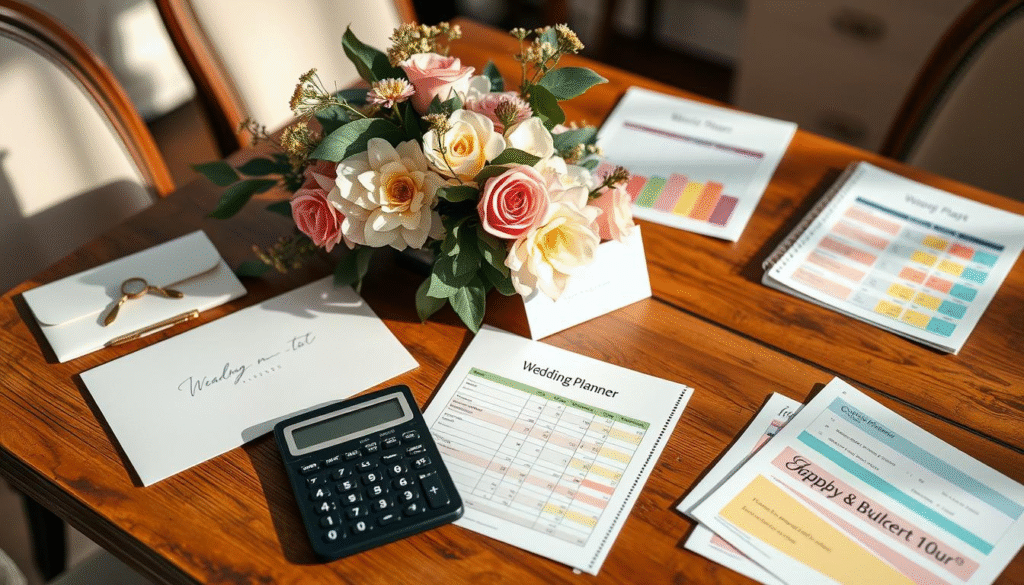
Choosing the Perfect Wedding Date
Choosing your wedding date is a big decision. It sets the mood for your whole celebration. You’ll need to think about things like where you’ll hold the wedding, when your family and friends are free, and any special dates that mean a lot to you. Taking your time to think about these things is important.
Factors to Consider When Picking a Date
When picking a wedding date, keep these things in mind:
- Venue Availability: Popular places can get booked up a long time in advance.
- Guest Schedules: Holidays and vacation times might make it harder for people to come.
- Significant Dates: Choosing a date that’s special to you can make your wedding even more meaningful.
- Weather Considerations: The weather can really affect how comfortable your guests are and the whole feel of your wedding.
Seasonal Trends in Wedding Dates
Knowing about seasonal wedding trends can help you decide. Each season has its own perks:
| Season | Pros | Cons |
| Spring | Blossoming flowers, mild temperatures | Possible rain, busy wedding season |
| Summer | Longer days, vibrant outdoor settings | High demand can lead to increased costs, heat |
| Fall | Beautiful foliage, moderate weather | Transition to cooler temperatures, holidays approaching |
| Winter | Unique charm, possible savings | Cold weather, limited outdoor options |
Finding Your Dream Venue
Choosing the right venue for your wedding is key. The style and feel of your big day depend on this choice. You can pick from beautiful gardens to sleek urban lofts. Think about indoor and outdoor venues based on what you like and the season.
Types of Wedding Venues: Indoor and Outdoor
Knowing the different venues helps narrow your search. Indoor venues offer a cozy, decorated space. Outdoor venues provide a natural setting for a beautiful backdrop. Each has its own benefits:
- Indoor Venues: Controlled climate, versatile lighting, perfect for any season.
- Outdoor Venues: Stunning views, natural light, great for a relaxed vibe.
How to Tour and Choose a Venue
Once you have a list of venues, it’s time to visit them. Look at the space for how many guests it can hold, its layout, and how easy it is to get around. Ask specific questions to help decide:
- What amenities are included in the rental?
- Are there rules about decorating or catering?
- What options are there for indoor and outdoor settings?
Choosing a venue should match your dream wedding. It should fit your budget and capture the essence of your special day.
| Venue Type | Advantages | Considerations |
| Indoor Venues | Weather-Proof, Decor Options, Controlled Environment | Limited Natural Light, Possible Restrictions |
| Outdoor Venues | Beautiful Scenery, Plenty of Light, Open Space | Weather Dependent, Need Permits |
Assembling Your Wedding Planning Team
Building a strong wedding planning team is key to a memorable event. Hiring a wedding planner can greatly reduce stress. They bring expertise to the table, making the planning process smoother.
The Role of a Wedding Planner
A wedding planner does a lot to make your wedding a success. They handle everything from the first planning stages to the big day. Their tasks include:
- Coordinating logistics and timelines.
- Providing expert advice on vendor selection.
- Managing budgets and contracts.
- Ensuring seamless communication between all parties involved.
Building Your Vendor Network
When building your planning team, creating a reliable vendor network is essential. This network should include florists, photographers, caterers, and musicians. Choosing the right vendors is important. Here are ways to build your network:
- Seek referrals from friends and family.
- Utilize online platforms to read reviews and view portfolios.
- Attend local bridal shows to meet vendors in person.
Choosing the right wedding planner and building a solid vendor network are key. They set the stage for an unforgettable wedding.
Deciding on Your Guest List
Creating the perfect guest list is a big challenge in wedding planning. Work with both families to start thinking about who to invite. Try to keep the list small, considering your budget and the venue’s size. A thoughtful guest list makes your wedding more special and ensures your closest friends and family are there to celebrate.
How to Compile a Guest List
Start by making a detailed list of everyone you want to invite. Sort them into groups like family, friends, and work colleagues. This way, you can see your guest list more clearly.
- Start with your closest family and friends.
- Think about what your parents might want during this time.
- Remember to include couples and families to avoid any mix-ups.
Managing RSVP and Attendance
Handling RSVPs well can make things less stressful and avoid surprises. Using online tools for RSVPs can make it easier to keep in touch with your guests. This way, you can keep track of who’s coming and plan the seating and food.
These steps are key to planning a great guest list. They help make your wedding a celebration of love and cherished relationships. Focus on good organization to make your day unforgettable.
Choosing Your Wedding Attire
Choosing the right wedding attire is key to showing off the bride and groom’s styles and personalities. It sets the mood for the wedding and makes sure everyone feels comfortable and elegant. Every choice, from the bride’s dress to the groom’s outfit, makes the day unforgettable.
Bridal Wear: Dresses and Accessories
Brides have endless options for their wedding wear. They can pick from classic ball gowns to modern slip dresses. It’s important to choose a style that fits their taste. Veils, tiaras, and jewelry add the final touches to the look.
Thinking about the dress’s shape, material, and color helps find the perfect one. This ensures it fits the wedding’s theme perfectly.
Outfits for Grooms and Wedding Party
Groom outfits should match the event’s style and the couple’s vision. Comfort is key, so they should feel at ease. Tuxedos or suits are popular choices.
It’s also important to coordinate the wedding party’s clothes. Bridesmaids and groomsmen should wear outfits that go well with the bride and groom’s attire. This creates a unified and stylish look for the whole party.
Managing Wedding Logistics
Managing wedding logistics is key to a smooth wedding day. A detailed wedding timeline is essential. It covers everything from hair and makeup to the ceremony and reception. This helps everyone stay on schedule and reduces stress.
Creating a Wedding Day Timeline
A detailed timeline helps organize your wedding day. Make sure to include:
- Hair and makeup schedule
- Arrival times for vendors
- Ceremony start time
- Reception details
Seeing your timeline helps you spot and fix any issues. Talking clearly with your wedding party and vendors is vital. This ensures everyone knows their role, making the day run smoothly.
Coordinating Transportation and Accommodation
Transportation is critical if your ceremony and reception are in different places. Here are some options:
- Shuttle services for guests
- Carpool options
- Arranging rides for family and VIP guests
Accommodation planning is also key for out-of-town guests. To help:
- Identify nearby hotels and venues
- Secure room blocks for guests
- Provide transportation details between accommodation and events
By focusing on transportation and accommodation, you make sure all guests have a great time. They can celebrate your special day without worrying about getting there.
Incorporating Personal Touches
Making your wedding memorable means adding personal touches that show your unique story. Wedding customization lets you make your ceremony and reception special. This way, everything feels like it’s made just for you and your partner.
Customizing Ceremony and Reception Elements
Think about how you can make your ceremony and reception special. Here are some ideas:
- Write personalized vows that tell your love story.
- Choose music that holds special meaning for both of you.
- Design decorations that show off your styles and memories together.
These choices make your event feel real and close. They help your guests feel connected to your journey.
Unique Ideas for Favors and Gifts
Unique wedding favors are a great way to thank your guests. Choose something that tells your couple’s story or represents your hometown. Here are some ideas:
- Make handmade crafts that show off your talent or hobby.
- Give local treats that let guests taste your community.
- Give personalized keepsakes like custom coasters or magnets.
These special touches give your guests memories to keep. They also show off your love story and planning.
| Type of Favor | Description | Personalization Options |
| Handmade Candles | Custom-scented candles that evoke a memory or place significant to the couple. | Custom labels with names and wedding dates. |
| Succulent Plants | Living gifts that guests can take home and nurture. | Tags with personal notes or thank-you messages. |
| Photo Frames | Simple frames that can hold a photo from the wedding day. | Engraving names and the event date. |
By choosing personal touches and unique favors, you make your wedding truly yours. It leaves a lasting impression on your loved ones.
Planning Your Wedding Ceremony
The wedding ceremony is the heart of any wedding. It sets the tone and atmosphere for the day. There are many types of ceremonies to choose from, each reflecting different beliefs and preferences. It’s important to pick one that shows who you are as a couple.
Types of Wedding Ceremonies
There are many ceremony types to choose from. Each one has its own flavor and meaning. Here are some popular ones:
- Religious Ceremonies: These ceremonies include religious rituals and texts, showing the couple’s faith.
- Civil Ceremonies: Conducted by a government official, these ceremonies are legal but don’t include religion.
- Themed Ceremonies: These ceremonies are based on a specific theme or interest, adding a personal touch.
Choosing Officiants and Readings
Choosing the right officiants is key. They help shape the ceremony. Many couples want officiants who share their beliefs and values. This makes the ceremony feel more personal.
When picking readings, couples often choose passages that speak to their relationship. These readings add a special touch, making the ceremony more emotional for everyone.
By carefully choosing the ceremony type, officiants, and readings, couples can create a ceremony that is both meaningful and memorable.
| Ceremony Type | Characteristics | Ideal For |
| Religious | Incorporates religious rituals, traditions, and texts. | Couples looking for a spiritual experience. |
| Civil | Conducted by a government official; secular in nature. | Couples who prefer a straightforward legality. |
| Themed | Personalized elements, often reflecting a shared interest. | Creative couples wanting a unique celebration. |
Getting Married: Legal Considerations
Getting married comes with legal steps that couples need to know. Each state has its own legal requirements for weddings. First, you must get a marriage license. It’s important to understand how to apply, what documents you need, and any waiting times.
Understanding Marriage Licenses and Requirements
To legally get married, you need a marriage license. These are given out by local government offices. The rules can vary, but often include:
- Proof of who you are, like a driver’s license or passport.
- A fee, which changes based on where you are.
- A waiting period—some places make you wait before the license is good.
Knowing these details can avoid problems on your big day.
Setting Up Legal Name Changes
If you want to change your name after getting married, there’s a process. It involves:
- Getting copies of your marriage certificate.
- Changing your ID, like your Social Security card, driver’s license, and passport.
- Telling banks, credit card companies, and others about your new name.
Conclusion
Looking back on your wedding planning, you’ve hit many important milestones. You’ve defined your vision and handled the legal stuff. Every step has brought you closer to your big day.
Planning a wedding is more than just details. It’s about capturing your relationship’s essence and sharing it with loved ones. This journey has its ups and downs, but with determination, you can make your dream wedding real.
Remember the memories you made while planning. Every choice, from the venue to the personal touches, adds to your wedding story. Enjoy the excitement of your wedding, knowing you’re ready to celebrate this new chapter together.
FAQ
What is the first step to take when planning a wedding?
The first step is to define your wedding vision. Decide if you want a traditional or modern style. Create a mood board for inspiration.
How do I set a wedding budget?
Start by listing all costs like venue, catering, and entertainment. Break these down to prioritize what’s important. Look into DIY options to save money.
What factors should I consider when choosing a wedding date?
Think about venue availability, guest schedules, and the date’s meaning to you. Summer dates are popular but might be pricier.
What types of wedding venues are available?
Venues range from indoor places like banquet halls to outdoor spots like gardens. Choose one that fits your vision and guest count.
How do I assemble a reliable wedding planning team?
Hire a wedding planner to help with planning. Then, find trusted vendors like photographers and florists through recommendations and reviews.
What is the best way to create a guest list?
Make an initial list with family input. Then, prioritize based on budget and venue. Use online RSVPs to track guests.
How should I choose my wedding attire?
Choose styles that match your wedding theme. Brides should try different dresses, while grooms should pick outfits that fit the theme. Don’t forget to coordinate outfits for the wedding party.
What is essential for managing wedding logistics?
A detailed wedding day timeline is key. It should outline all events. Arrange transportation and accommodation for guests for a smooth day.
How can I add personal touches to my wedding?
Personalize vows, decorations, and music to reflect your story. Consider unique favors that guests will remember.
What are the types of wedding ceremonies I can choose from?
You can have religious, civil, or themed ceremonies. Choose an officiant who fits your vision to make the ceremony special.
What legal considerations should I be aware of when getting married?
Understand how to get a marriage license, including required documents and waiting periods. If you want to change your name, know the legal steps involved.


